
Tezpur is a city in Sonitpur district, Assam state, India. Tezpur is located on the banks of the river Brahmaputra, 175 kilometres (109 mi) northeast of Guwahati, and is the largest of the north bank cities.

Srimanta Sankardev was a 15th–16th century Assamese polymath; a saint-scholar, poet, playwright, dancer, actor, musician, artist social-religious reformer and a figure of importance in the cultural and religious history of the Bhakti movement in Assam. He is credited with building on past cultural relics and devising new forms of music (Borgeet), theatrical performance, dance (Sattriya), literary language (Brajavali). Besides, he has left a literary oeuvre of trans-created scriptures, poetry and theological works written in Sanskrit, Assamese and Brajavali. The Bhagavatic religious movement he started, Ekasarana Dharma and also called Neo-Vaishnavite movement, influenced two medieval kingdoms – Koch and the Ahom kingdom – and the assembly of devotees he initiated evolved over time into monastic centers called Sattras, which continue to be important socio-religious institutions in Assam and to a lesser extent in North Bengal.
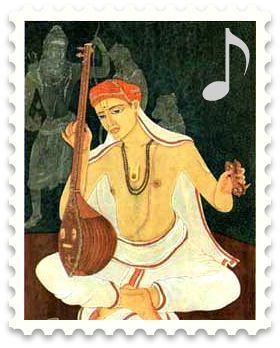
The music of Assam consists various genres of folk and modern music, drawing its artistic basis from the history of Assam, from Assamese culture and its ancient traditions. In recent times, starting from the late eighties, popular artists have modernised the music catering to local popular demand.
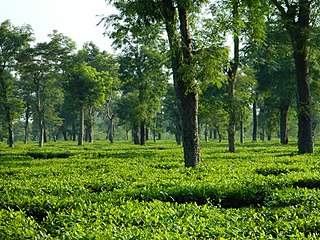
Dibrugarh is a city in Upper Assam with sprawling tea gardens. It is located 435 kms East from the state capital of Dispur. It serves as the headquarters of Dibrugarh district in the state of Assam in India. Dibrugarh serves as the headquarters of the Sonowal Kachari Autonomous Council, which is the governing council of the Sonowal Kachari tribe. The historic town of Dibrugarh was formally announced as 2nd City of Assam on 7 March 2024 with the formation of Dibrugarh Municipal Corporation by dissolving The Municipal Board

Assamese literature is the entire corpus of poetry, novels, short stories, plays, documents and other writings in the Assamese language. It also includes the literary works in the older forms of the language during its evolution to the contemporary form and its cultural heritage and tradition. The literary heritage of the Assamese language can be traced back to the c. 9–10th century in the Charyapada, where the earliest elements of the language can be discerned.

Jyoti Prasad Agarwala was a noted Indian playwright, songwriter, poet, writer and film maker from Assam. He was deeply revered for his creative vision and output and is popularly called the Rupkonwar of Assamese culture. In fact, he is regarded as the founder of Assamese cinema for Joymoti (1935). His death anniversary is observed as Silpi divas his honor.
| awards = See below | website = }}
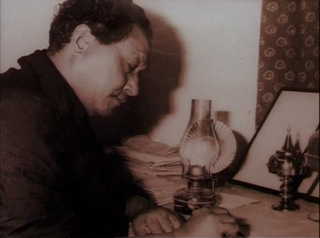
Bishnu Prasad Rabha (1909–1969) was an Indian cultural figure from Assam, known for his contributions in the fields of music, dance, painting, literature as well as political activism. As an advocate of people's cultural movement, he drew heavily from different genres of classical and folk cultural traditions. Considered a doyen of the Culture of Assam, the People of Assam affectionately call him Kalaguru. He is also called by Marxists as Sainik Silpi for his active participation in the armed struggle, led by the Revolutionary Communist Party of India (RCPI).

Joymoti is a 1935 Indian film widely considered to be the first Assamese film ever made. Based on Lakshminath Bezbaroa's play about the 17th-century Ahom princess Joymoti Konwari, the film was produced and directed by the noted Assamese poet, author, and film-maker Jyoti Prasad Agarwala, and starred Aideu Handique and acclaimed stage actor and playwright Phani Sarma. The film, shot between 1933 and 1935, was released by Chitralekha Movietone on 10 March 1935 and marked the beginning of Assamese cinema.
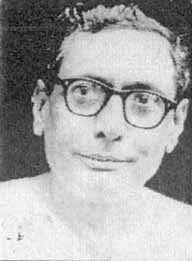
Phani Sarma (1910–1970) was an Indian theatre actor, playwright, film actor and director. Beginning as a stage actor, he appeared in the first film ever made in Assamese cinema, Joymati, in 1935. Sarma was conferred with the title "Natasurya" for his contribution towards Assamese drama.
Prof Bhabananda Deka was a pioneer Assam economist and author who conducted novel research on the economy of the far eastern part of India. He was also a leading Indian-Assamese litterateur of the famed 'Awahon-Ramdhenu Era' of Assamese literature during the mid-20th century. He was the author of a total of 115 English and Assamese books including textbooks on a range of fifteen subjects including economics, ancient Assamese literature, philosophy, education, religion, mythology, archaeology, tribal study, poetry, drama, memoirs, civics, political science, biographies; he also edited books and journals. He also authored a variety of research papers and articles about the state of Assam, a state in the north-eastern part of India. He pioneered the writing of books on Economics in Assamese. His Assamese book Axomor Arthaneeti was the first ever research-based comprehensive book on Assam Economics, which was published for the first time in 1963. He was conferred with the honorary title of 'Asom Ratna' -- 'Jewel of Assam' by the intellectuals of Assam on 19 August 2007 at a public meet held under the presidency of Prof. (Dr) Satyendra Narayan Goswami.

Hiren Bhattacharyya, popularly known as Hiruda, was an Indian poet and lyricist best for his works in the Assamese literature. He had innumerable works published in Assamese and achieved many prizes and accolades for his poetry. In 2012, Bhattacharyya died at hospital due to undergoing treatment for lung and urinary tract infection since 14 June.
Rita Chowdhury is an Indian poet and novelist who writes Assamese literature and is a recipient of the Sahitya Akademi Award. She is the editor of the Assamese literary magazine Gariyoshi and a former director of the National Book Trust, India. She has been associate professor and lecturer at Cotton College, Guwahati, Assam in the Political Science Department and was active in the Assam Movement in the early 1980s.

Borgeets are a collection of lyrical songs that are set to specific ragas but not necessarily to any tala. These songs, composed by Srimanta Sankardeva and Madhavdeva in the 15th-16th centuries, are used to begin prayer services in monasteries, e.g. Satra and Namghar associated with the Ekasarana Dharma; and they also belong to the repertoire of Music of Meghalaya outside the religious context. They are a lyrical strain that express the religious sentiments of the poets reacting to different situations, and differ from other lyrics associated with the Ekasarana Dharma. Similar songs composed by others are not generally considered borgeets.
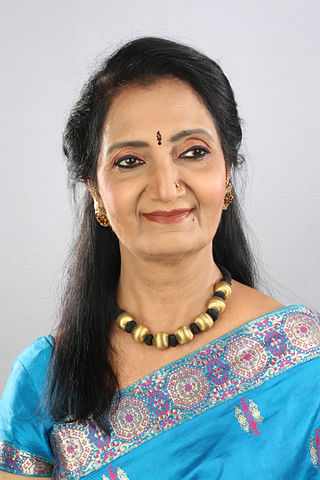
Beauty Sharma Barua is a singer from Assam, India. She is one of the best-known and most respected Assamese folk music, Indian classical music, ghazal and bhajan singers of Assam. More popularly known as The Melody Queen of Assam and Beauty Baideu, she has recorded over a thousand songs for All India Radio, Doordarshan, albums and others. She has sung songs in over six regional Indian languages, though primarily in Assamese and Hindi. Beauty Barua married renowned writer and lyricist Dwijendra Mohan Sharma (1948–2006), called the Man with Melody in His Pen by The Daily Telegraph, in 1976.

Gunamala is a scripture written by Sankardev within one night at the request of Koch king Nara Narayan in 1552. It is an abridged version (handbook) of Bhagavata Purana capturing in racy, rhyming and sonorous verses. The poet recounts many incidents from Lord Krishna's life making them easy to remember in this book.

Baharul Islam is an Indian theater actor and alumnus of the National School of Drama, which he joined in 1987. He has acted in more than 80 plays and has designed and directed 30 plays for his theater troupe Seagull. He works as a film actor in Assamese and Hindi cinema.
Surjya Kanta Hazarika is an Assamese litterateur, an eminent scholar, author, journalist, poet, publisher, playwright, lyricist, composer, cultural activist, feature film and documentary maker, social worker and philanthropist. Hazarika is a recipient of the Padma Shri Award in 2008 for his contribution to Literature & Education. He is the current president of Asam Sahitya Sabha.


















